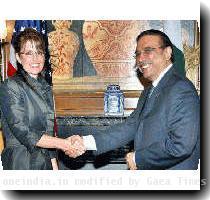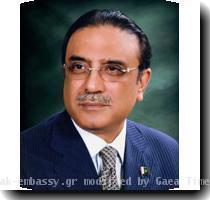Police say suicide bomber kills 3 outside press club in Pakistan’s northwest Peshawar city
By Riaz Khan, APTuesday, December 22, 2009
Suicide bomber kills 3 near NW Pakistan press club
PESHAWAR, Pakistan — A suicide bomber detonated his explosives outside a press club in the northwestern city of Peshawar on Tuesday, killing three people and wounding 17 in an attack that comes at a time of growing violence and political turmoil in Pakistan.
Militants have perpetrated a string of attacks in the country’s northwest in revenge for an army offensive in the lawless tribal area of South Waziristan, the Pakistani Taliban’s main stronghold. But many militants are believed to have fled to North Waziristan since the campaign began in mid-October.
On Tuesday, leaflets appeared in the area in which the Pakistani Taliban leader urged his fighters not to stir trouble there, apparently in the hopes of securing sanctuary in a region where many other insurgent groups operate.
In Peshawar, a policeman tried to search the suicide bomber as he approached the press club’s gate, but the man resisted and was able to trigger his explosives, said the city’s police chief, Liaquat Ali Khan. The dead included the officer and an accountant who worked for the organization, authorities said.
A woman who was at the site died after having a heart attack caused by the shock of the bombing, said Sahib Gul, a doctor at a hospital in Peshawar where casualties were taken. Seventeen other people were wounded, many of whom had been traveling in a bus that passed the press club when the explosion occurred, Gul said.
“Journalists have played a vital role in our war by exposing the terrorists, so they are on the target list too like mosques, bazaars and security institutions,” said Mian Iftikhar Hussain, the information minister for the North West Frontier Province, of which Peshawar is the capital.
Many of the Pakistani Taliban are now believed to be operating from North Waziristan, a region dominated by militants who have a truce with the government.
In a leaflet posted and distributed in markets in the North Waziristan town of Mir Ali, Pakistani Taliban commander Hakimullah Mehsud ordered his fighters to “avoid criminal activities, kidnapping, creating trouble and interfering in internal affairs in North Waziristan.”
“Anybody found violating this order will be considered guilty in the eyes of the Pakistani Taliban Movement and will be liable for punishment,” said the leaflet.
The document was signed by Mehsud and carried a letterhead bearing his name. It was impossible to fully authenticate the leaflet, and Taliban spokesmen could not immediately be reached for comment. But militants frequently communicate using such means in the tribal areas.
Many of the groups in North Waziristan are focused on launching cross-border attacks on coalition soldiers in Afghanistan rather than waging war on the government in Islamabad, a primary target of the Pakistani Taliban. One of the most powerful militants in the area, Hafiz Gul Bahadur, signed a truce with the Pakistani military agreeing to stay on the sidelines as it invaded South Waziristan to root out Taliban and al-Qaida fighters.
The presence of large numbers of Pakistani Taliban could persuade the military to expand its offensive into North Waziristan, a move that would endanger the other militant groups that have established sanctuary there, including the powerful Haqqani network, an Afghan Taliban faction.
Mehsud’s statement could be an attempt to convince these groups that despite the increased risk, they should allow Pakistani Taliban fighters to remain in the area. However, he did authorize his followers to fight back in self-defense.
Interior Minister Rehman Malik asserted Tuesday that the country’s security forces had broken the backbone of the Taliban in South Waziristan and they were having trouble finding local support to hide.
“My information is that Taliban’s recruits are deserting them,” he said.
The government has pledged to continue its fight against the militants, but growing political turmoil over a Supreme Court decision to strike down an amnesty protecting several senior officials, including President Asif Ali Zardari, from corruption charges threatens to distract the civilian leadership.
One of those affected by the ruling was the interior minister, who was convicted several years ago of fleeing the country to avoid two corruption cases and was sentenced to three years in prison.
An appeals court in the eastern city of Lahore suspended the prison sentence Tuesday, allowing Malik to avoid arrest until the judges begin hearings at the end of January. Malik denies wrongdoing.
Former President Pervez Musharraf agreed to the amnesty in 2007 as part of a U.S.-backed deal to allow Zardari’s wife, former Prime Minister Benazir Bhutto, to return from self-imposed exile. Bhutto was killed in a bombing in December of that year, and Zardari led the party to an election victory in 2008.
____
Associated Press writers Rasool Dawar in Mir Ali and Zarar Khan in Islamabad contributed to this report.
Tags: As-pakistan, Asia, Asif Ali Zardari, Bombings, Islamabad, Pakistan, Peshawar, South Asia, Terrorism

